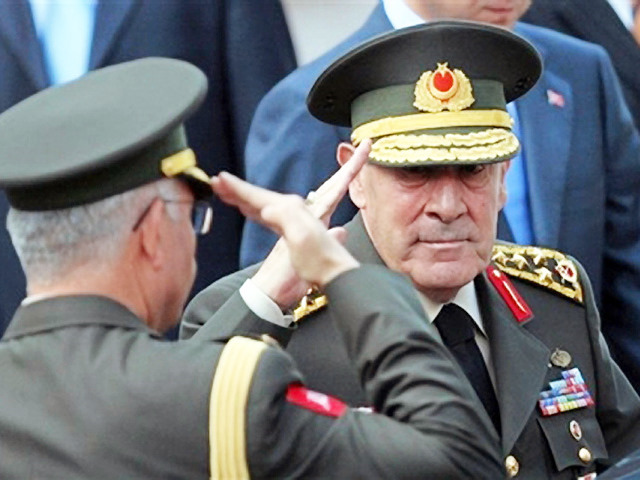
TURKISH CHIEF OF STAFF FACING DILEMMA OVER PRESIDENTIAL ELECTIONS
Publication: Eurasia Daily Monitor Volume: 4 Issue: 145
By:

On July 26 the Turkish press quoted Devlet Bahceli, leader of the ultranationalist National Action Party (MHP), as stating that the party would not boycott the parliamentary vote to elect the country’s next president, thus effectively opening the way for the AKP to appoint any candidate of its choosing (Milliyet, Aksam July 26).
Under Turkish law, and given the distribution of seats after the July 22 general election, the only way the government of the Justice and Development Party (AKP) can be prevented from appointing its own candidate to the presidency is if all of the main opposition parties boycott the vote and prevent parliament from reaching the required quorum of two-thirds of its members. Bahceli’s statement would thus appear to open the way for Foreign Minister Abdullah Gul, who on July 25 implied that he would be the party’s candidate for the presidency (see EDM, July 25). Yet an attempt by the AKP to appoint Gul to the presidency in April 2007 triggered such a strongly worded warning from Turkey’s powerful military that the party was forced call a general election over three months ahead of schedule on July 22.
Bahceli’s surprise statement has suddenly brought the Turkish military back onto the political agenda. Unless either Bahceli or Gul is prepared to back down, initial expectations that the July 22 election results presaged an easing of civil-military tensions (see EDM, July 23) may turn out to be premature. Bahceli’s statement has also left General Yasar Buyukanit, chief of the Turkish General Staff (TGS), facing one of the most difficult decisions of his command.
Buyukanit was appointed at the end of August 2006. His predecessor, General Hilmi Ozkok, who had assumed command in August 2002, had antagonized many in the Turkish officer corps by refusing to be more assertive in his relations with the AKP government, following its victory in the November 2002 elections.
The TGS has always seen itself as the primary guardian of the principle of secularism enshrined in the Turkish constitution. In common with other secularists, many members of the officer corps suspected that the AKP was biding its time before implementing a radical Islamist agenda, probably starting after it tightened its control over the apparatus of state by appointing one of its hard-line members to the presidency when the term of the incumbent Ahmet Necdet Sezer came to an end in May 2007.
Traditionally, the Turkish chief of staff has been drawn from the Land Forces. Buyukanit’s appointment as commander of the Land Forces in August 2004 was greeted with relief in the TGS. With his affable personality, strong commitment to secularism — and hard-line stance on topics such as Cyprus and the Kurdish issue, Buyukanit was both liked and respected by the officer corps. The expectation was that, when he was appointed chief of staff, the TGS would be more assertive in its dealings with the AKP government and prevent a hard-line Islamist from becoming president. Although there were differences on the precise definition of what it meant to be “hard-line,” almost all were agreed that having a first lady who wore an Islamic headscarf would be unacceptable. One of the main reasons why the TGS intervened in April 2007 to block Gul’s candidacy was that his wife covers her head.
Since assuming command at the end of August 2006, Buyukanit has largely fulfilled the expectations of his subordinates. Although the AKP’s sudden decision in April 2007 to name Gul as its candidate for the presidency initially alarmed the officer corps, they were reassured by the swiftness and decisiveness with which Buyukanit responded.
But the burden of expectation has come with a price. A naturally emotional man who likes to speak his mind, Buyukanit has often been frustrated by the need to remain silent. Since blocking Gul’s bid for the presidency in April 2007, Buyukanit has deliberately adopted a very low public profile. There was a general sense in the TGS that the intervention had served its purpose and that, although it would probably still win the July 22 election, AKP would not only have a reduced majority but would attempt to avoid another confrontation by putting forward a compromise candidate for the presidency. Recent events suggest that such hopes were misplaced.
There is no desire in the TGS to take over the running of the country. However, after what happened in April 2007, if Buyukanit were to stand by and allow Gul to be appointed to the presidency, it would be a personal humiliation for him and an institutional one for the TGS. The Turkish military is very much aware that ultimately its ability to influence government policy depends more on its still considerable public prestige rather than its ability to put soldiers on the streets. If neither Bahceli nor Gul backs down, the latter is appointed president, and TGS does not react, the military will lose face and, from the perspective of the officer corps, Buyukanit will have failed to deliver on his mandate. Yet any public warning to the government would risk alienating the nearly half of the electorate who voted for the AKP in the July 22 elections.




